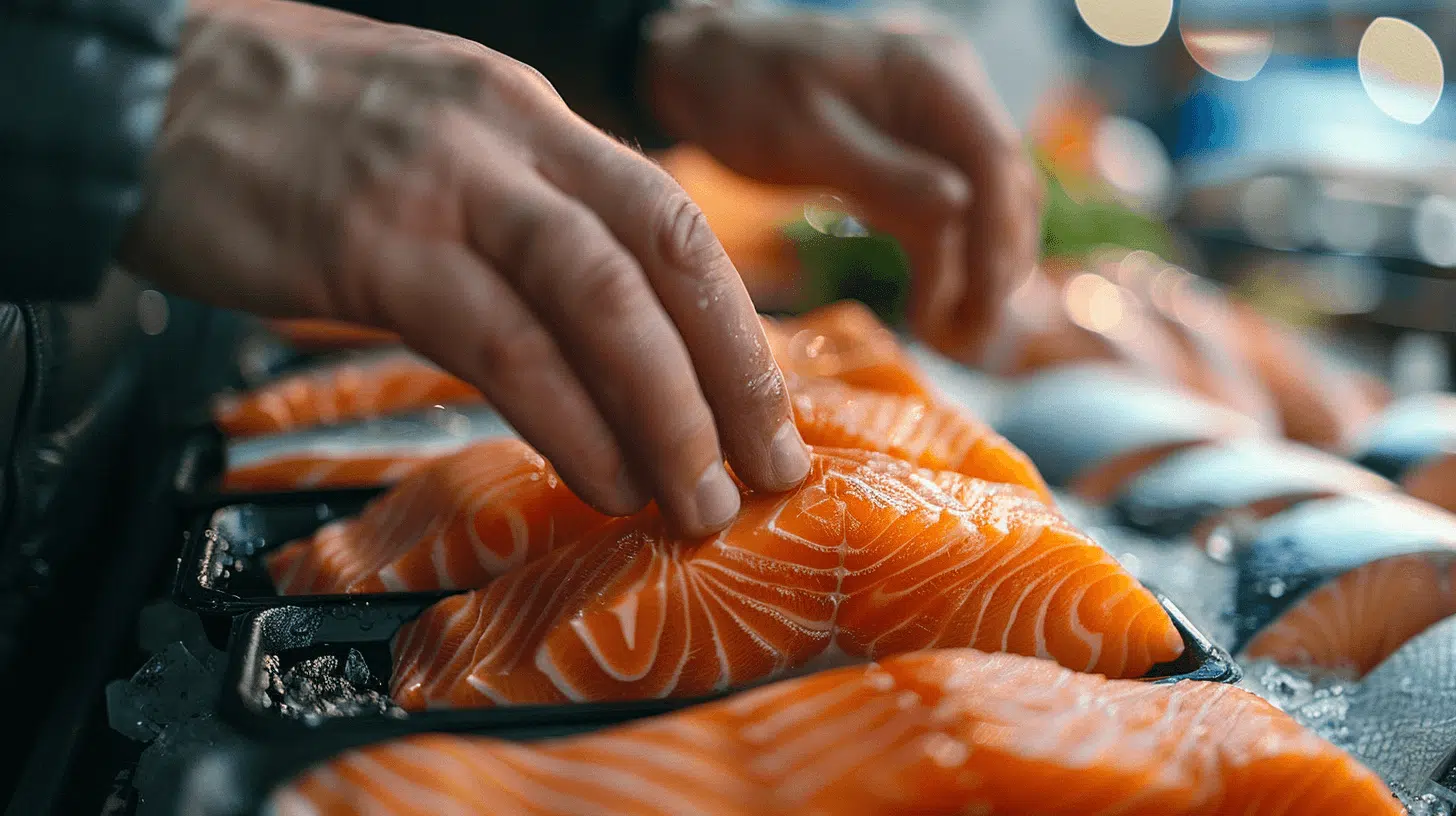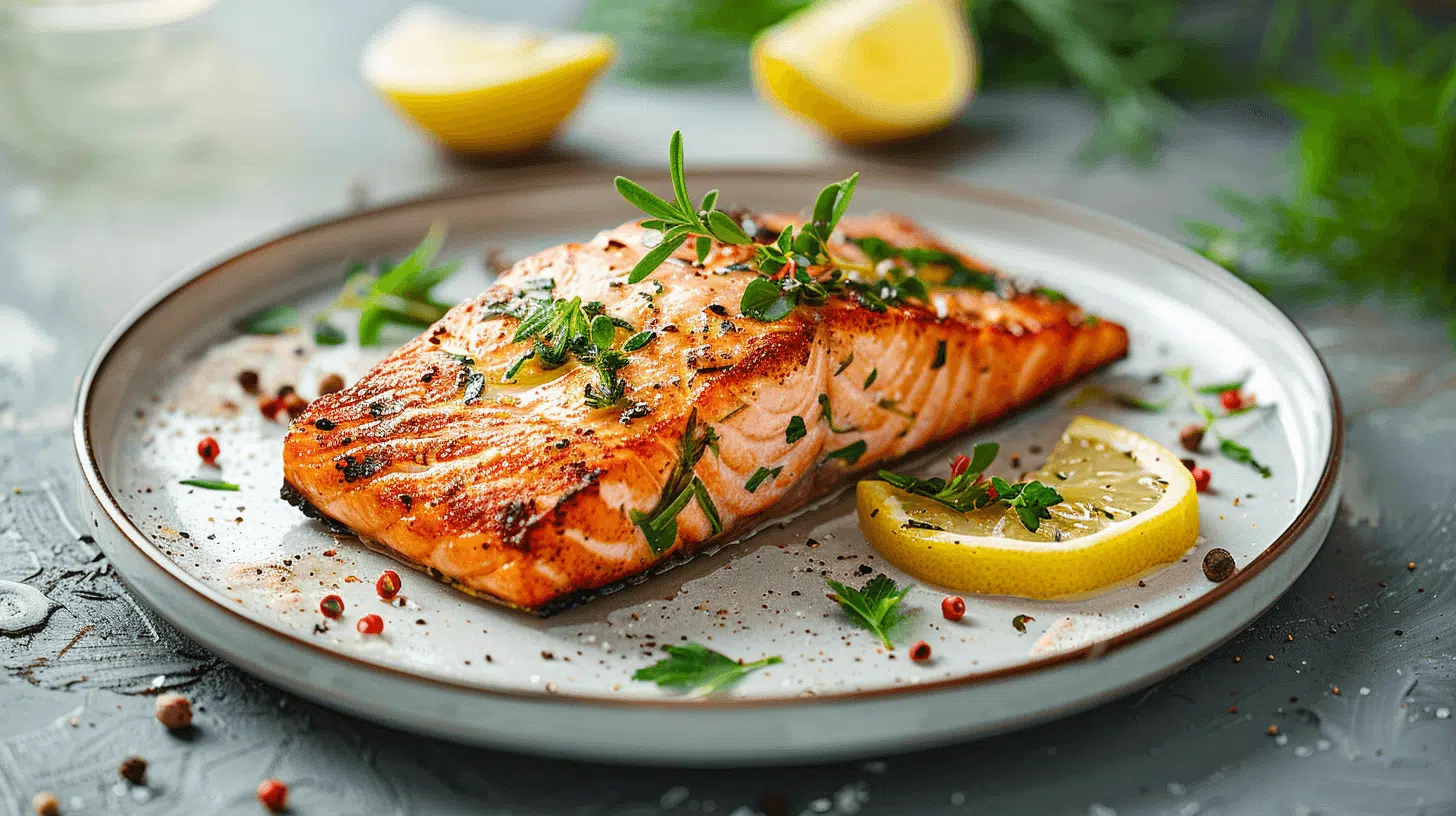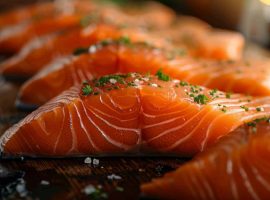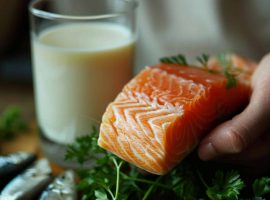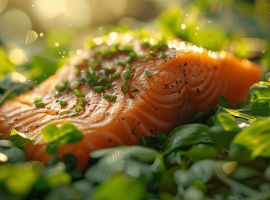Nutritional Profile and Weight Management Benefits of Fish
Fish, a staple in many diets worldwide, is renowned for its high protein content and essential omega-3 fatty acids. When considering weight loss, the protein in fish serves as a critical component. It not only aids in muscle maintenance but also increases satiety, which can lead to reduced calorie intake and better appetite control. This makes fish an excellent choice for those looking to manage their weight effectively.
Omega-3 Fatty Acids and Metabolic Health
The omega-3 fatty acids, particularly DHA and EPA, found in fish like salmon and mackerel, play a significant role in fat metabolism. They enhance the body’s ability to burn fat by increasing fat oxidation and reducing fat storage. This metabolic boost is crucial for individuals aiming to achieve a caloric deficit, which is essential for weight loss.
Optimal Fish Varieties for Dieting
For those seeking low-calorie options, lean fish such as cod, halibut, and tilapia are optimal. These varieties provide the necessary nutrients without excessive calories, making them ideal for inclusion in a weight loss diet. On the other hand, fatty fish, despite their higher calorie content, are rich in omega-3s and should not be overlooked for their weight loss benefits.
Incorporating Fish into a Caloric Deficit Diet
Incorporating fish into one’s diet can contribute significantly to a caloric deficit. The key is to choose the right types of fish and prepare them using healthy cooking methods such as grilling, baking, or steaming. These methods not only preserve the nutritional integrity of the fish but also minimise additional calorie intake from cooking oils or breading often associated with frying.
Optimal Fish Varieties for Weight Loss
When selecting fish for weight loss, lean varieties such as cod, halibut, and tilapia are excellent choices due to their low-fat content and high protein levels, which can help in creating a caloric deficit. These fish are conducive to weight management as they provide substantial nourishment without excessive calories.
Fatty Fish and Weight Management
Fatty fish, including salmon, mackerel, and herring, are rich in omega-3 fatty acids, which have been linked to various health benefits that support weight loss. The consumption of these fish can lead to improved metabolic health and may aid in reducing body fat.
The Role of Rohu and Katla in Dieting
Specific species like Rohu and Katla, commonly consumed in Indian cuisine, are not only flavorful but also beneficial for weight loss. They are packed with high-quality protein that helps in maintaining muscle mass during weight loss and omega-3 fatty acids that contribute to overall health.
Omega-3s: Enhancing Weight Loss Efforts
Omega-3 fatty acids found in mackerel and herring are pivotal in enhancing weight loss efforts. They play a role in fat metabolism and may increase the body’s ability to burn fat as fuel. Including these fish in your diet can be a strategic move towards achieving weight loss goals.
Incorporating Fish into a Weight Loss Diet
Integrating fish into a balanced diet can be a strategic approach to weight loss. Fish, being a high-protein food, contributes to satiety, helping you feel full longer and potentially reducing overall calorie intake. For those looking to lose weight, incorporating fish into meals can be a flavorful way to enhance nutritional intake without compromising calorie goals.
Recommended Fish Serving Sizes
For weight loss, it is recommended to consume 3.5-ounce servings of fish, which can provide a substantial amount of protein with relatively few calories. Including at least two servings of fish per week, with one being an oily fish rich in omega-3 fatty acids, aligns with dietary guidelines and supports a balanced approach to weight loss.
Fish and Dietary Satisfaction
Fish consumption can significantly influence dietary satisfaction. The protein in fish aids in regulating hunger hormones, which can lead to a decrease in appetite and a lower likelihood of overeating. This makes fish an excellent component of a weight loss meal plan, as it can help manage hunger while providing essential nutrients.
Risks of Overconsumption
While fish is a healthy addition to a diet, it is important to be aware of the risks associated with overconsumption of certain types. High mercury content in fish like shark, swordfish, and king mackerel can pose health risks, so it’s advisable to opt for varieties with lower mercury levels, such as salmon, sardines, and trout.
Healthiest Cooking Methods for Fish
To maximise the weight loss benefits of fish, it’s essential to choose cooking methods that retain the nutritional value while minimising added fats and calories.
Grilling, Baking, and Steaming for Weight Loss
Grilling, baking, and steaming are excellent methods for preparing fish that support a weight loss regimen:
- Grilling: Provides a smoky flavour and allows excess fat to drip away from the fish.
- Baking: Requires minimal added fat and preserves the fish’s moisture and flavour.
- Steaming: Cooks the fish in its own juices, maintaining its nutritional integrity without the need for oil.
Flavorful, Low-Calorie Seasoning Options
Enhancing the taste of fish without adding significant calories can be achieved through various seasonings:
- Herbs and Spices: Fresh or dried herbs like dill, parsley, and paprika add robust flavour without calories.
- Citrus Zest and Juice: Lemon or lime zest and juice impart a fresh taste and can help reduce the need for salt.
- Vinegars: Balsamic or apple cider vinegar provide a tangy flavour that complements the fish’s natural taste.
Sustainable Weight Loss with Home-Cooked Fish
Cooking fish at home is a sustainable weight loss strategy, allowing for control over ingredients and portion sizes. By preparing fish using these methods, you can enjoy delicious meals that contribute to your weight loss goals while ensuring you’re consuming nutrient-rich, low-calorie dishes.
Selecting Low-Mercury Fish for Regular Consumption
When incorporating fish into your diet for weight loss, it’s crucial to consider mercury content. Fish such as salmon, sardines, and trout are known for their lower mercury levels, making them suitable for regular consumption. These varieties provide the benefits of high-quality protein and omega-3 fatty acids, essential for a balanced weight loss diet, without the risks associated with higher mercury fish.
Making Informed Decisions on Fish Safety
To ensure fish safety, consumers are advised to consult regional advisories and opt for smaller-sized fish, which typically accumulate less mercury. It’s also beneficial to diversify fish choices to minimise potential mercury exposure.
Demographic-Specific Fish Consumption Guidelines
Different demographics, such as pregnant women, breastfeeding mothers, and young children, should adhere to specific guidelines that limit intake of high-mercury fish. For the general adult population, a varied selection of low-mercury fish is recommended to balance safety with nutritional benefits.
Mercury’s Impact on Weight Loss and Health
While mercury content in fish does not directly affect weight loss, it can have implications for overall health. High mercury exposure can lead to adverse health effects, which may indirectly influence weight management and wellness. Therefore, selecting low-mercury fish is a prudent choice for maintaining both a healthy weight and overall health.
Sustainable Seafood: A Healthy Choice for You and the Planet
Choosing sustainably sourced fish is not only beneficial for personal health but also vital for the health of the planet. Sustainable fishing practices ensure that fish populations and their habitats are preserved for future generations, while also providing consumers with toxin-lower seafood options.
Certifications Indicating Sustainable Seafood
When shopping for fish, consumers should look for certifications such as the Marine Stewardship Council (MSC) or Aquaculture Stewardship Council (ASC) labels. These indicate that the seafood has met rigorous standards for sustainability and responsible fishing practices.
Wild-Caught Versus Farmed Fish: A Consideration for Weight Loss
The choice between wild-caught and farmed fish can influence both weight loss and sustainability. Wild-caught fish often have a more varied diet and can be leaner, which is beneficial for weight loss. However, responsibly farmed fish can provide a more consistent supply without depleting natural stocks, contributing to environmental sustainability.
Frozen Fish Direct’s Role in Sustainable Seafood
Frozen Fish Direct plays a pivotal role by offering a selection of sustainably sourced seafood. They provide consumers with access to high-quality fish, ensuring that the products offered contribute to both healthy diets and the preservation of marine ecosystems.
Omega-3 Fatty Acids and Weight Management
Omega-3 fatty acids, prevalent in fish like salmon, mackerel, and herring, are essential fats that your body cannot produce on its own. They play a significant role in weight management by influencing the body’s metabolic processes.
Scientific Evidence on Omega-3s for Weight Control
Research indicates that omega-3 fatty acids can enhance the body’s ability to burn fat by boosting metabolic rate and fat oxidation. They are also known to reduce inflammation, which is linked to obesity and metabolic syndrome.
Comparing Fish-Derived Omega-3s to Supplements
Omega-3s from fish are often considered superior to those from supplements due to the natural balance of fats and the presence of other beneficial nutrients in fish. Whole fish also provides protein and other vitamins and minerals that support overall health and weight management.
Broader Health Benefits of Omega-3 Fatty Acids
Beyond aiding in weight loss, omega-3 fatty acids contribute to:
- Cardiovascular Health: They can reduce triglycerides and blood pressure, lowering the risk of heart disease.
- Cognitive Function: Omega-3s are linked to reduced rates of cognitive decline and improved brain health.
- Joint Health: Their anti-inflammatory properties can alleviate symptoms of rheumatoid arthritis.
Incorporating fish into your diet can thus support not only weight loss but also a range of health benefits, making it a valuable addition to a healthy lifestyle.
Simple and Quick Fish Recipes for Weight Management
Incorporating fish into your diet need not be complex or time-consuming. Here are some straightforward recipes that align with weight loss objectives:
- Grilled Lemon-Herb Salmon: Season a salmon fillet with lemon juice, garlic, and herbs, then grill until flaky.
- Baked Cod with Vegetables: Wrap cod and your choice of vegetables in foil with olive oil and bake.
- Spicy Tuna Patties: Mix canned tuna with whole grain breadcrumbs and spices, then pan-fry.
Diverse Cuisines Featuring Weight-Loss-Friendly Fish
Fish is versatile and can be adapted to various cuisines:
- Asian-Style Steamed Fish: Steam white fish with soy sauce, ginger, and scallions for an Asian flair.
- Mediterranean Grilled Mackerel: Grill mackerel with a mix of olives, tomatoes, and herbs.
- Indian Spiced Grilled Tilapia: Marinate tilapia in a blend of Indian spices and yoghourt before grilling.
Meal Prepping Tips with Fish
To ensure portion control and convenience:
- Pre-portioned Packs: Divide fish into individual portions before refrigerating or freezing.
- Marinate Ahead: Prepare marinades in advance and soak the fish overnight for quick cooking.
- Batch Cooking: Cook a larger quantity of fish at once and store it for easy meals throughout the week.
Accessing Quality Fish with Frozen Fish Direct
Frozen Fish Direct provides a seamless solution for obtaining high-quality fish:
- Wide Selection: Choose from a variety of fish, suitable for any recipe or diet preference.
- Convenience: Order online and have the fish delivered directly to your door, ready to cook.
- Quality Assurance: Fish are frozen at peak freshness, ensuring nutrient retention and flavour.
Dispelling Myths About Fish and Weight Loss
Misconceptions about the calorie content of fish may lead some to underestimate its value in a weight loss diet. Contrary to some beliefs, most fish are low in calories and high in protein, making them an excellent food choice for managing weight.
Impact of Misinformation on Consumer Choices
Myths surrounding fish and weight gain can deter individuals from including this nutrient-rich food in their diets. It’s crucial to understand that fish, particularly lean varieties, can be a lower-calorie alternative to other protein sources, supporting weight loss when prepared healthily.
Whole Fish Versus Fish Oil Supplements
While fish oil supplements are convenient, they lack the additional nutritional benefits of whole fish, such as protein, vitamins, and minerals that are essential for a balanced diet. Whole fish is a more comprehensive option for those looking to lose weight and improve overall health.
Navigating Misinformation in Diet
To make informed decisions about including fish in a weight loss diet, consumers should:
- Seek Reliable Sources: Consult nutritionists or trusted health information websites for accurate data on fish and weight loss.
- Understand Nutritional Labels: Read labels carefully when purchasing fish or supplements to ensure they align with dietary goals.
- Be Critical of Fad Diets: Be wary of diets that make unfounded claims about fish and weight loss, and always prioritise balanced eating.
Fish Intake and Metabolic Syndrome
Regular consumption of fish, particularly varieties rich in omega-3 fatty acids, has been associated with improvements in metabolic syndromea cluster of conditions that includes increased blood pressure, high blood sugar, excess body fat around the waist, and abnormal cholesterol levels. The inclusion of fish in one’s diet can positively influence these conditions, potentially reducing the risk of developing metabolic syndrome.
Fish and Insulin Sensitivity
The omega-3 fatty acids found in fish like salmon, mackerel, and sardines may enhance insulin sensitivity, which can be beneficial for individuals managing conditions like type 2 diabetes. By improving the body’s ability to use insulin effectively, fish consumption can help regulate blood sugar levels and support metabolic health.
Managing Hypothyroidism and PCOS with Fish
Fish consumption can also play a role in managing endocrine disorders such as hypothyroidism and polycystic ovary syndrome (PCOS). The nutrients found in fish, including iodine and selenium, are essential for thyroid function, which can be compromised in these conditions. Regular intake of fish may support hormonal balance and alleviate some symptoms associated with these disorders.
Hormonal and Metabolic Health Implications
Incorporating fish into the diet has broader implications for hormonal and metabolic health. The nutrients in fish support various bodily functions that are crucial for maintaining hormonal equilibrium and metabolic processes, making fish a valuable food for overall well-being.
Balancing Mercury Exposure and Fish Benefits
Incorporating fish into your diet requires a careful balance to reap the health benefits while minimising mercury exposure. Opting for fish with lower mercury levels, such as salmon, anchovies, and sardines, is a prudent choice. These varieties provide the necessary nutrients without the risks associated with higher mercury fish.
Challenges of Sustainable Fish Consumption
Sustainable fish consumption is essential for environmental preservation and personal health. The challenge lies in identifying and choosing seafood that is both sustainably sourced and rich in nutrients. Look for certifications like the Marine Stewardship Council (MSC) label to ensure that your seafood choices support ecological balance.
Adapting Diets to Include Diverse Fish
Diversifying your fish intake can enhance your diet without compromising on taste or variety. Explore different species and cooking methods to keep your meals exciting and nutritionally balanced. Incorporating a range of fish can also mitigate the risks associated with mercury exposure.
Frozen Fish Direct’s Role in Addressing Consumer Challenges
Frozen Fish Direct addresses these challenges by providing a wide selection of sustainably sourced, low-mercury fish options. They ensure that consumers have access to high-quality seafood that supports both their health goals and environmental responsibility. With Frozen Fish Direct, you can enjoy the convenience of home delivery while maintaining a diverse and nutritious diet.
Key Takeaways for Fish in Weight Loss Diets
Fish stands out as a nutrient-dense food that can play a pivotal role in weight management. Its high protein content aids in satiety and muscle maintenance, while omega-3 fatty acids contribute to fat metabolism and overall health. For those seeking weight loss, incorporating a variety of fish, particularly fatty and lean types, is recommended for a balanced diet.
Sustaining Weight Loss with Fish
A long-term approach to weight loss with fish involves regular consumption of recommended portions, diversifying fish types to prevent dietary monotony, and employing healthy cooking methods like grilling, baking, or steaming. These practices help maintain a nutrient-rich diet conducive to weight management.
Integrating More Fish into Your Diet
To increase fish intake, start by including fish in at least two meals per week, experiment with different recipes to find what suits your palate, and be mindful of portion sizes. Educate yourself on the mercury content of various fish to make safe choices, especially for vulnerable populations.
Partnering with Frozen Fish Direct for Weight Loss Goals
Frozen Fish Direct can be a valuable partner in achieving weight loss goals by providing access to a wide range of high-quality, sustainably sourced fish. Their service ensures that you have the convenience of selecting from various fish options to support your dietary needs while focusing on weight loss.





